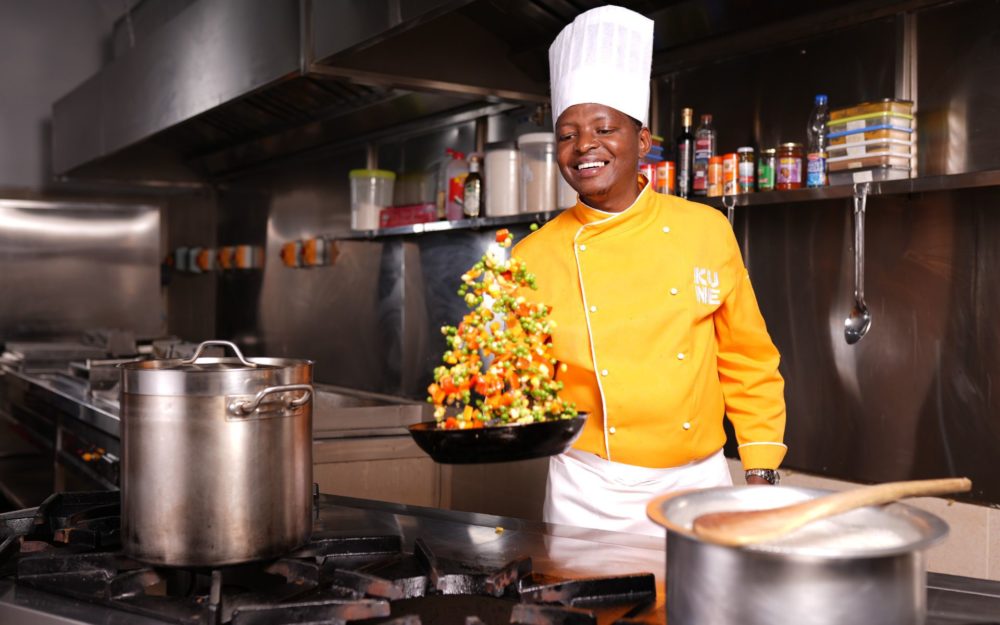Nairobi is witnessing an explosion of last-mile food and grocery delivery. For employees in offices and families at home, ordering a meal has become commonplace.
One issue, however, is lack of choice. “People have been ordering fast food because they don’t have an option,” Faith Mwendia, managing director of Kune, told AFN.
In recent months, the Kenyan food delivery startup has been researching the market. It learned that a majority of office workers want a homemade, well-balanced meal that comes at an affordable price rather than fast food. But no-one was offering such a service at scale.
“We saw a big gap in last-mile delivery of tasty African cuisine. This is a market we want to serve,” Mwendia said.
In January, Kune began commercial operations after investing in tech-driven facilities that give it “total control” of the supply chain from sourcing and cooking to ordering and delivery.
Last year it raised $1 million in pre-seed funding from investors including Launch Africa, Century Oak Capital, and Pariti that was used to develop technological capabilities including online and mobile apps, hire employees, grow its network of local suppliers, and construct an operations hub including a kitchen and packaging facility.
It’s now in the midst of raising a seed round to increase production capacity and build a national footprint over the next two years, before embarking on Africa-wide expansion.
As an early entrant, Kune sees vast opportunity in offering Kenyans “fresher and healthier” meal options at affordable prices (its meals sell for around $3 each on average.)
‘We’re a company that champions local’
A 2020 analysis by market insights firm Fitch Solutions showed that Kenya’s food delivery sector is primed for rapid expansion, driven by consumers and businesses adjusting their behavior due to the Covid-19 pandemic, a growing middle class, and high internet penetration rates.
Other factors include significant growth in the use of mobile digital payments, a road network that is well developed and well-connected, and a thriving and vibrant industry around motorcycle taxis — colloquially known as ‘boda-boda’ by the local population — that’s “well-positioned to pivot their services towards the growing demand for last mile delivery solutions,” notes the Fitch analysis.
This conducive environment has given rise to a flourishing sector, with firms like Uber Eats, Jumia Food, Glovo, Bolt Food, and Yum among others championing its growth.
Kune has come in with a totally different concept.
“We are a homegrown company that champions local: working with local suppliers, and building on local recipes,” Mwendia said.
Women entrepreneurs are unlocking value in Africa’s overlooked agrifood resources – read more here
Though sourcing is currently done through middlemen, Kune intends to eventually bring on board contracted farmers: a development that will mean more earnings for small-scale primary producers.
And, unlike other food delivery firms, Kune has opted not to invest in a fleet of motorcycles. Instead, it has decided to plug into existing mobility networks like those run by Glovo, Bolt, and Uber.
“We want to concentrate on our core business of cooking tasty foods for our customers,” Mwendia says.
Via its online platform and mobile app, every customer order is processed within five minutes and automatically allocated to one of a pool of around 100 riders. Delivery is guaranteed within 30 minutes.
“The ability to use technology to control the entire supply chain makes our meals affordable,” states Mwendia.
The company is in the process of integrating USSD for customers without smartphones.
She adds that Kune is offering opportunities for university students to earn by doing bicycle deliveries. This enables the startup to live up to its promise of delivering orders within 30 minutes, despite the often unbearable traffic that characterizes Kenya’s capital.
Diversifying distribution channels
Though only two months into operations, Kune is now delivering over 400 meals a day across Nairobi, and expects to grow that to 1,000 meals per day by the end of this quarter.
Apart from serving individual consumers, the startup has contracts with 10 corporate clients to provide meals for their employees; it’s targeting at least 30 more such contracts by the end of the year. This growth strategy includes the opening of four more distribution centers by December.
Kune has additionally entered into agreements with supermarkets where retail customers can buy its meals, and is exploring partnerships with office blocks to open canteens; the startup is also pioneering a new vending machine concept which is undergoing testing and configuration.
Mwendia said that Kune has invested heavily in research and development. It has a dedicated in-house team working on technology and menu advancement to meet the changing demands of customers.
And, conscious of the importance of sustainability and environmental protection, the startup has teamed up with a service provider that collects and recycles around 60% of its waste – which would otherwise typically be incinerated, adding to its carbon footprint.





